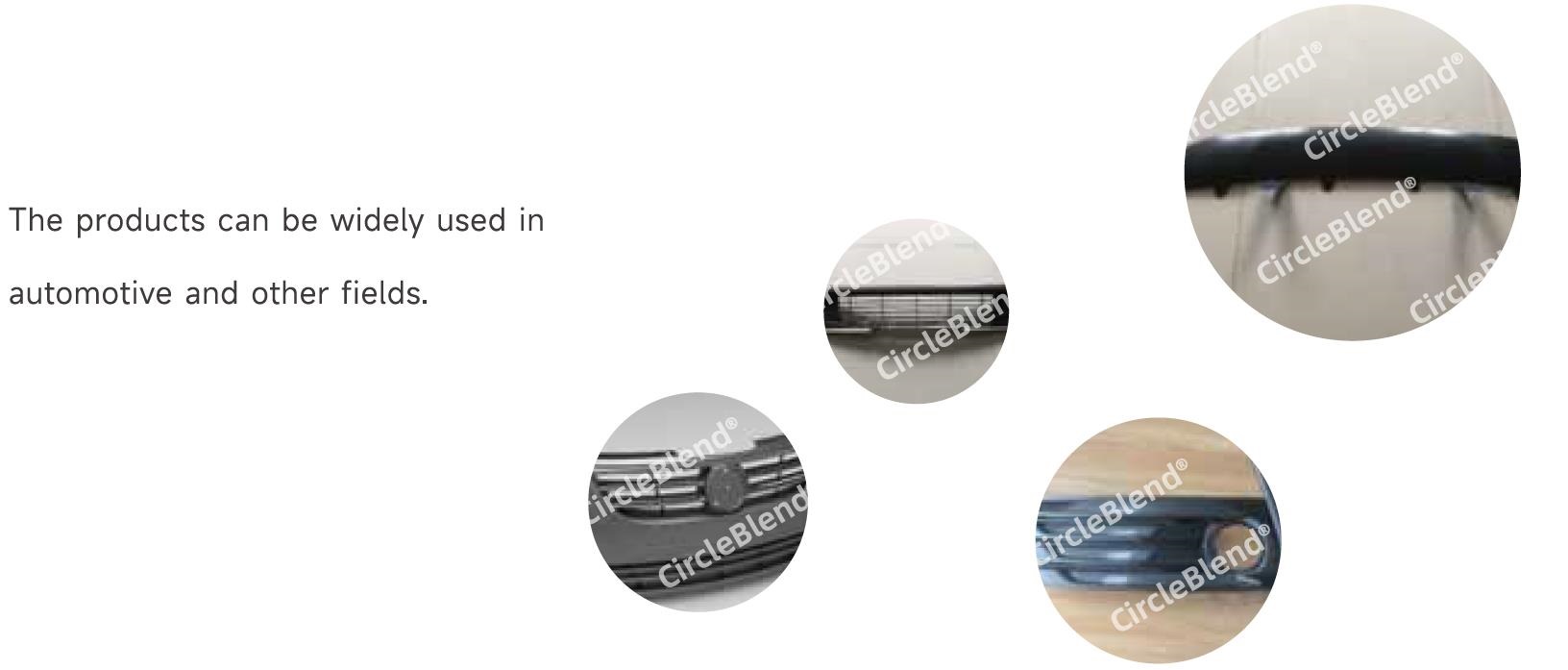
CircleBlend® Modified polypropylene (PP) materials are produced by compounding recycled and/or virgin PP with various fillers and additives, such as talc or glass fiber. This series includes talc-filled toughened PP, talc-filled high-rigidity PP, and glass fiber-reinforced PP, among other products.
| Material Brand | Product Features | Melt Flow Index (g/10min) | Tensile Strength (MPa) | Flexural Modulus (MPa) | Notched Impact Strength (KJ/m²) | UL 94 | Color | PCR Content (%) | Carbon Footprint (t CO2/t) | Typical Applications |
|---|---|---|---|---|---|---|---|---|---|---|
| PP-T20(HII01) | 15% Talc-Filled Toughened | 15-25 | 17 | 1400 | 05 | HB 3.0mm | Natural or Colored | 85 | 0.678 | Automotive Bumper Molding |
| PP-T20(GPI02) | 20% Talc-Filled | 20-30 | 22 | 2000 | 4 | HB 3.0mm | Natural or Colored | 80 | 0.664 | Automotive Bumper Molding |
| PP-T20(HII01) | 20% Talc-Filled Toughened | 20-30 | 18 | 1600 | 17 | HB 3.0mm | Natural or Colored | 70 | 0.592 | Automotive Bumper Molding |
| PP-T30(GPI01) | 30% Talc-Filled | 20-30 | 21 | 1700 | 6 | HB 3.0mm | Natural or Colored | 70 | 0.636 | Automotive Bumper Molding |
| PP-T30(HI01) | 30% Talc-Filled Toughened | 10-20 | 19 | 2000 | 15 | HB 3.0mm | Natural or Colored | 60 | 0.622 | Grille Bracket Side Skirt Trim Panels |
| PP-G20(GPI01) | 20% Glass Fiber Reinforced | 5-15 | 60 | 3600 | 5 | HB 3.0mm | Natural or Colored | 75 | 0.628 | Automotive Exterior Structural Parts |
| PP-G30(GPI01) | 30% Glass Fiber Reinforced | 3-10 | 70 | 4500 | 7 | HB 3.0mm | Natural or Colored | 65 | 0.603 | Automotive Exterior Structural Parts |
| PP-N00(FR01) | Halogen-Free Flame Retardant | 5-11 | 18 | 800 | 8 | V2 1.5mm | Natural or Colored | 80 | 0.934 | Electrical Appliances Furniture |
| PP-N00(FR01) | Halogen-Free Flame Retardant | 10-20 | 25 | 2000 | 3.5 | V0 1.5mm | Natural or Colored | 70 | 0.991 | Electrical Appliances Furniture |
CircleBlend®,rPPBlend®,ITEBlend®,OBPBlend®,AppBlend®,ReAutoBlend®;



We offer a wide variety of materials, including general plastics, engineering plastics, and specialty plastics, covering almost all types of recycled polymers.

With a dedicated R&D team, we continuously innovate and develop high-performance, customized material solutions to meet diverse industry needs.

From research and testing to manufacturing and sales, we provide end-to-end solutions, streamlining the supply chain for our clients.

Our products promote low-carbon, circular economy practices,supporting global sustainability efforts with bio-based and degradable materials.
Sustainable low - carbon functional materials are applied across numerous critical areas. In the energy sector, they are pivotal. For instance, advanced photovoltaic materials with low - carbon manufacturing processes are used to construct more efficient solar panels. These materials enhance the conversion of sunlight into electricity, contributing to the expansion of renewable energy sources and reducing reliance on fossil fuels.
In the textile industry, sustainable low - carbon functional materials are making waves. Bio - based and recycled fibers are being used to create fabrics. These materials not only consume less energy during production but also have a lower environmental impact compared to traditional synthetic fibers. Moreover, some functional textiles made from these materials can regulate body temperature, repel water, or provide UV protection, all while maintaining a low - carbon footprint.
In the textile industry, sustainable low - carbon functional materials are making waves. Bio - based and recycled fibers are being used to create fabrics. These materials not only consume less energy during production but also have a lower environmental impact compared to traditional synthetic fibers. Moreover, some functional textiles made from these materials can regulate body temperature, repel water, or provide UV protection, all while maintaining a low - carbon footprint.


